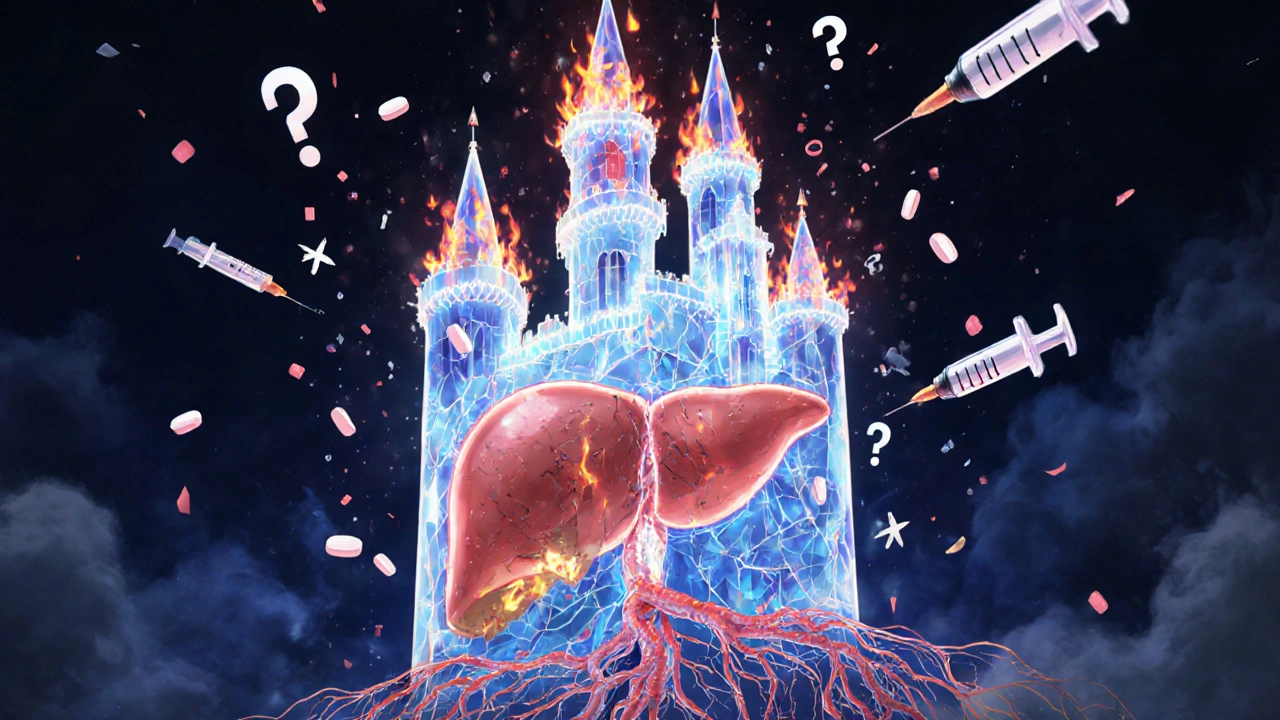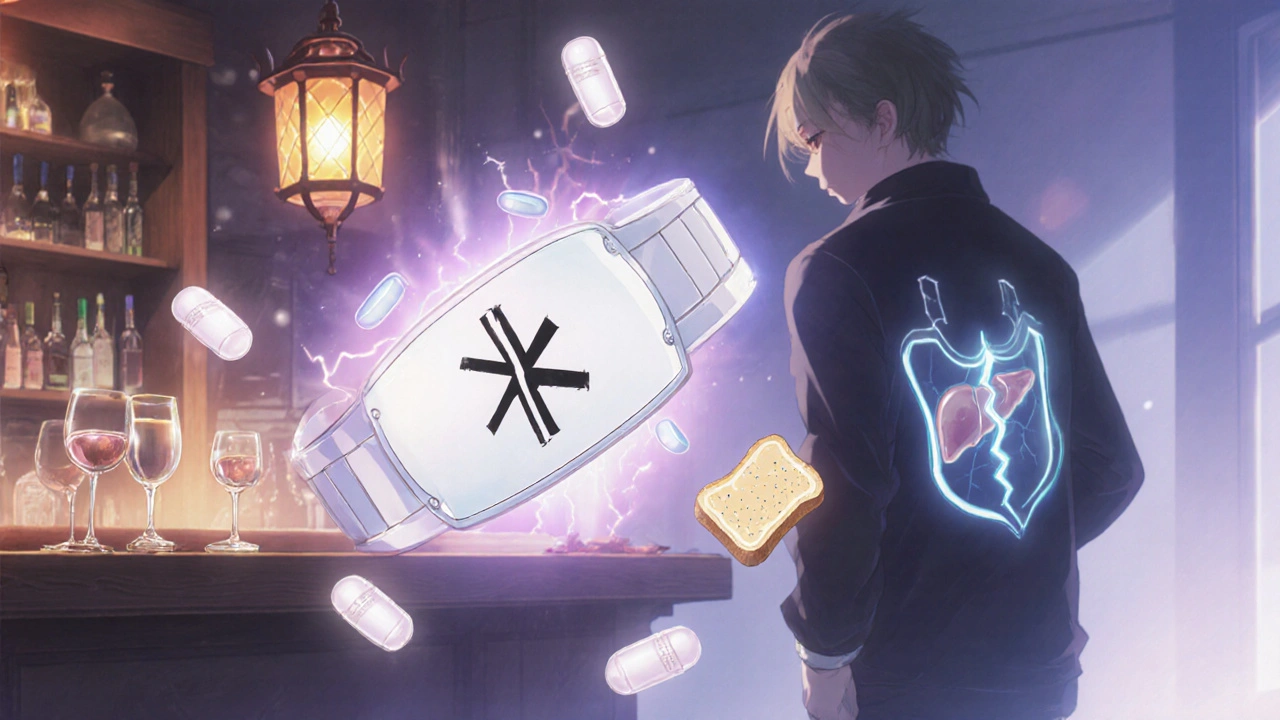Hypoglycemia Risk Calculator
This calculator estimates your risk of alcohol-induced hypoglycemia based on your medication type, alcohol consumption, and other factors.
Input Your Details
Risk Assessment
Recommendations:
Drinking alcohol while taking diabetes medication isn’t just a bad idea-it can be dangerous, even life-threatening. If you’re on insulin, sulfonylureas, or metformin, alcohol doesn’t just add empty calories. It messes with your liver, hides low blood sugar symptoms, and can send your glucose crashing hours after your last sip. This isn’t about willpower or discipline. It’s about how your body actually works-and what happens when alcohol steps in.
How Alcohol Triggers Hypoglycemia
Your liver has two main jobs: keep your blood sugar steady, and break down toxins like alcohol. When you drink, it drops everything else to handle the alcohol. That means it stops releasing glucose into your bloodstream. If you’re taking insulin or a sulfonylurea like glipizide or glyburide, your body is already pushing to lower blood sugar. Add alcohol, and your liver can’t compensate. The result? A sudden, deep drop in glucose. This isn’t just a risk while drinking. It can happen 8 to 12 hours later, especially if you’ve been active or skipped a meal. Many people wake up in the middle of the night with shaking, sweating, and confusion-thinking it’s just a bad dream. But it’s hypoglycemia. And if you’re asleep, you might not wake up. The worst part? The symptoms look exactly like being drunk. Slurred speech, dizziness, confusion, stumbling. Emergency responders, friends, even family can mistake a medical crisis for intoxication. That’s why so many people with diabetes end up in the ER after drinking-and why some don’t make it out.Why Metformin and Alcohol Are a Risky Mix
Metformin is one of the most common diabetes pills. It’s usually safe, but alcohol changes the game. Both metformin and alcohol are processed by the liver. When you combine them, your liver gets overloaded. That increases your risk of lactic acidosis-a rare but serious condition where lactic acid builds up in your blood. Symptoms include nausea, vomiting, stomach pain, weakness, and rapid breathing. It’s not common, but it’s deadly if ignored. Even if you don’t develop lactic acidosis, the side effects of metformin and alcohol overlap. Both can cause nausea, gas, cramps, and loss of appetite. Together, they make you feel worse than either one alone. People who drink regularly while on metformin often report constant digestive discomfort, fatigue, and a general sense of being unwell. That’s not normal aging. That’s your liver screaming for a break. There’s also the issue of medication quality. In 2020, the FDA recalled some extended-release metformin tablets because of a probable carcinogen called NDMA. While that recall didn’t directly involve alcohol, it shows how sensitive your system is when you’re on diabetes meds. Mixing alcohol with any medication you’re unsure about? That’s playing with fire.Liver Damage: The Silent Killer
Your liver doesn’t just store sugar-it cleans your blood. Alcohol turns it into a detox factory. Every drink forces your liver to work harder. Over time, that leads to fatty liver, inflammation, fibrosis, and eventually cirrhosis. People with diabetes already have a higher risk of liver disease. Add alcohol, and the damage speeds up. Studies show that heavy drinking-five or more drinks a day for men, four or more for women-reduces liver function and makes blood sugar control nearly impossible. The enzymes that break down alcohol (CYP2E1, CYP3A4) also break down metformin and other diabetes drugs. When alcohol blocks these enzymes, your medication sticks around longer than it should. That means more side effects, more risk of low blood sugar, and more strain on your organs. And here’s the cruel twist: liver damage often has no symptoms until it’s advanced. You might feel fine, check your blood sugar, see it’s “normal,” and think you’re okay. But your liver is already failing. By the time you feel tired, yellow, or bloated, it’s too late for simple fixes.
What to Do If You Choose to Drink
The safest choice? Don’t drink. But if you do, here’s what actually works:- Always eat carbs with alcohol. No exceptions. A slice of toast, a small apple, a handful of crackers. Your liver needs glucose to fight the drop. Drinking on an empty stomach is like stepping off a cliff.
- Stick to low-sugar drinks. Avoid sweet cocktails, sugary mixers, and regular soda. Choose light beer, dry wine, or seltzer with a splash of lime. Sugar spikes your blood sugar, then alcohol crashes it. That rollercoaster is brutal on your body.
- Limit yourself. One drink for women, two for men-max. And space them out. Don’t binge. Even moderate drinking can trigger hypoglycemia if you’re on insulin or sulfonylureas.
- Check your blood sugar before, during, and after. Don’t rely on how you feel. Test. If your level is below 100 mg/dL, eat something. Keep glucose tablets or juice nearby. Don’t wait for symptoms.
- Wear a medical ID. If you collapse, someone needs to know you have diabetes. Not that you’re “just drunk.”
- Tell someone you’re diabetic. A friend, a partner, a bartender. If you start acting confused or dizzy, they need to know it’s not intoxication-it’s low blood sugar.
What Your Doctor Should Tell You
Most doctors don’t bring this up. A 2021 study found only 43% of primary care doctors routinely ask diabetic patients about alcohol. That’s a failure. Your medication regimen, liver health, and history of low blood sugar episodes should all factor into this conversation. Ask your doctor:- Is my current medication safe with alcohol?
- Do I have signs of liver damage?
- Should I avoid alcohol entirely because of my risk of hypoglycemia unawareness?

Real Stories, Real Consequences
Online diabetes forums are full of stories like this: > “I had two glasses of wine with dinner. Checked my sugar before bed: 110. Woke up at 3 a.m. shaking, drenched in sweat. Glucometer read 42. Took three glucose tabs. Called 911. My husband thought I was drunk. I wasn’t.” > “I stopped checking after drinking. Thought I was fine. Ended up in the hospital with severe hypoglycemia. They said I was lucky I didn’t have a seizure.” > “I switched from metformin to a different pill after my liver enzymes spiked. My doctor said alcohol was the main cause. I quit drinking. My energy came back. My A1C dropped.” These aren’t outliers. They’re common. And they’re preventable.The Bottom Line
Alcohol doesn’t care about your medication schedule, your A1C goals, or your insulin pump settings. It overrides your body’s natural defenses. For people with diabetes, the risks far outweigh any perceived benefits. Even moderate drinking can lead to unpredictable lows, liver damage, and missed diagnoses. If you’re thinking about having a drink, ask yourself: Is one glass worth risking a trip to the ER, a hospital stay, or permanent liver damage? The answer isn’t the same for everyone. But the science is clear: alcohol and diabetes meds don’t mix safely. And if you’re not sure? Skip it. Your liver, your brain, and your future self will thank you.Can I drink alcohol if I have type 2 diabetes and take metformin?
It’s possible, but risky. Metformin and alcohol both stress the liver, increasing the chance of lactic acidosis-a rare but serious condition. Alcohol also lowers blood sugar, which can be dangerous when combined with metformin’s effects. If you choose to drink, limit it to one drink for women or two for men, always eat carbs with it, and avoid drinking on an empty stomach. Talk to your doctor first, especially if you have liver issues or a history of low blood sugar.
Why does alcohol cause low blood sugar in people with diabetes?
The liver normally releases stored glucose to keep blood sugar stable. But when alcohol is present, the liver prioritizes breaking down alcohol instead. This stops glucose release. If you’re taking insulin or sulfonylureas, your body is already lowering blood sugar. Without the liver’s backup, your glucose can crash-sometimes hours after your last drink.
Can I tell if I’m having low blood sugar or just drunk?
It’s nearly impossible. Both conditions cause dizziness, confusion, slurred speech, and drowsiness. If you’re drinking and feel off, assume it’s low blood sugar until proven otherwise. Always check your glucose level. Never rely on how you feel. That’s why wearing a medical ID and telling people you have diabetes is critical.
What drinks are safest for people with diabetes?
Choose low-sugar options: dry red or white wine, light beer, or unsweetened seltzer with lime. Avoid sugary cocktails, regular soda, juice, and sweet mixers. These spike blood sugar first, then alcohol crashes it. That rollercoaster is hard on your body and increases hypoglycemia risk.
How long after drinking can low blood sugar happen?
Up to 12 hours. Alcohol suppresses the liver’s ability to release glucose for hours after the last sip. That’s why many people wake up in the middle of the night with dangerous lows. If you drink, check your blood sugar before bed and set an alarm to check again in 6-8 hours. Keep fast-acting carbs nearby.
Should I stop drinking alcohol completely if I have diabetes?
It’s the safest choice. Alcohol adds no nutritional value and increases your risk of hypoglycemia, liver damage, and poor blood sugar control. Many people with diabetes feel better-more energy, better sleep, more stable glucose-after quitting. If you’re unsure, talk to your doctor about your personal risk. For most, the benefits of avoiding alcohol outweigh any perceived enjoyment.



Josh Gonzales
November 25, 2025 AT 20:23Just want to say this post is one of the clearest breakdowns I’ve seen on alcohol + diabetes meds. I’m a nurse and I see this exact scenario way too often-people wake up comatose from hypoglycemia and the ER assumes intoxication. The liver conflict with metformin is under-discussed. Seriously, if you’re on it and drink, you’re playing Russian roulette with your mitochondria.
Ellen Sales
November 27, 2025 AT 09:29THIS. THIS. THIS. I spent 3 days in the hospital last year because I had a glass of wine after dinner and woke up at 3am with my heart pounding like a jackhammer. My glucometer read 38. My husband thought I was drunk. I was 20 minutes from a seizure. I quit alcohol cold turkey. My A1C dropped from 8.1 to 5.9 in 4 months. Your liver isn’t just a filter-it’s your lifeline. Don’t gamble with it.
Jack Riley
November 28, 2025 AT 04:20Let’s be real-the real danger isn’t alcohol. It’s the medical system’s lazy assumption that ‘moderation’ is a universal truth. You wouldn’t tell someone with a pacemaker to ‘drink in moderation’ while near high-voltage wires. Why treat diabetes like it’s a lifestyle choice instead of a physiological warzone? The liver doesn’t negotiate. It doesn’t care about your ‘social life.’ It just shuts down. And when it does, you’re not ‘just drunk’-you’re a walking medical emergency.
Jacqueline Aslet
November 28, 2025 AT 09:09One must consider the metaphysical implications of biochemical interference. Alcohol, as a psychoactive agent, disrupts not merely hepatic glucose homeostasis, but the very ontological equilibrium between agency and biological determinism. One’s will, one’s autonomy, one’s very identity as a self-regulating organism, is subsumed by the molecular tyranny of ethanol. To drink, then, is not indulgence-it is surrender to the entropy of metabolic collapse.
Caroline Marchetta
November 29, 2025 AT 06:46Oh, so now we’re supposed to feel guilty for enjoying a glass of wine? How quaint. Let me just grab my lab coat and my guilt-trip cocktail-dry vermouth, no ice, and a side of medical authoritarianism. I mean, sure, my liver might be screaming, but at least I’m screaming with style. Also, my A1C is ‘fine.’ So there.
Valérie Siébert
December 1, 2025 AT 01:14Y’all need to stop overcomplicating this. I switched to sparkling water with lime after my last ER trip. No more midnight shakes. No more ‘I thought I was fine’ lies. My energy is back. My skin cleared up. I sleep like a baby. Alcohol isn’t worth the chaos. Just say no. Your body already knows the answer.
katia dagenais
December 2, 2025 AT 08:31Let’s not pretend this is about ‘willpower.’ This is about systemic neglect. Doctors don’t warn us because they’re overworked, underpaid, and trained to treat symptoms, not root causes. And then we’re left to Google our own mortality. I’ve seen three friends end up in ICU because no one told them about the 12-hour delay. It’s not ‘risky’-it’s a silent death sentence wrapped in a cocktail napkin. And yes, I’ve stopped drinking. Not because I’m scared. Because I’m tired of being a statistic.
Austin Doughty
December 3, 2025 AT 20:01Everyone’s acting like alcohol is the devil. What about the 50% of diabetics who drink and never have an issue? You’re all panic-mongering. I’ve had 3 beers with dinner for 12 years. My A1C is 6.4. My liver enzymes? Perfect. You think you’re saving lives by scaring people? You’re just making them feel ashamed. Chill the hell out.
Oli Jones
December 4, 2025 AT 23:38I’m British, and we’ve got a long history of ‘a pint won’t hurt.’ But after watching my father spiral into alcoholic liver disease while on metformin, I’ve learned: the UK’s casual attitude toward alcohol is a quiet epidemic. I now only drink on rare occasions, always with food, always with a glucometer nearby. It’s not about denying pleasure-it’s about preserving dignity. Your liver doesn’t get a second chance. Neither do we.
Josh Gonzales
December 6, 2025 AT 13:23@Austin Doughty: You’re right-some people do drink without incident. But ‘some’ isn’t ‘all.’ And the ones who don’t show symptoms until they’re in cardiac arrest? They don’t get to post about it. The data doesn’t lie: alcohol doubles the risk of severe hypoglycemia in insulin users. That’s not fearmongering. That’s epidemiology. If you’re lucky, fine. But betting your life on luck? That’s not confidence. That’s negligence.